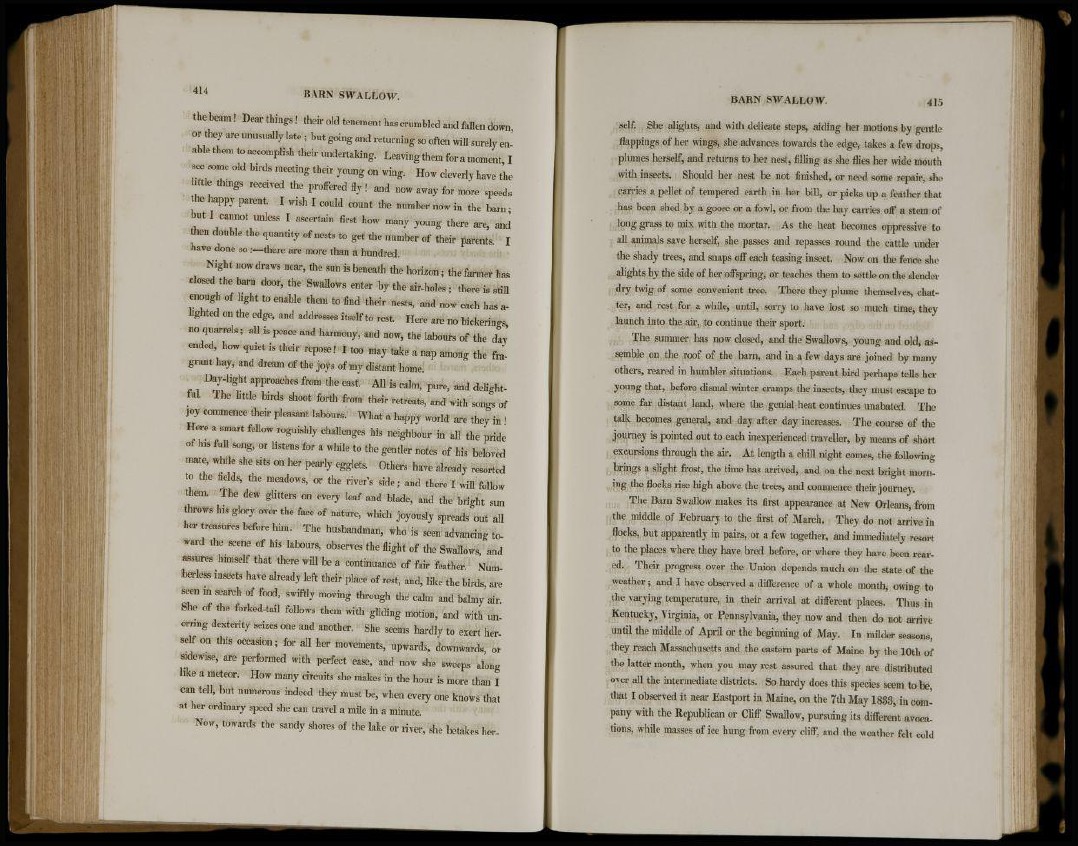
the beam ! Dear things ! their old tenement has crumbled and fallen down,
or they are unusually late ; but going and returning so often will surely enable
them to accomplish their undertaking. Leaving them for a moment, I
see some old birds meeting their young on wing. How cleverly have the
little things received the proffered fly ! and now away for more speeds
the happy parent. I wish I could count the number now in the barn;
but I cannot unless I ascertain first how many young there are, and
then double the quantity of nests to get the number of their parents. I
have done so :—there are more than a hundred.
Night now draws near, the sun is beneath the horizon ; the farmer has
closed the barn door, the Swallows enter by the air-holes; there is still
enough of light to enable them to find their nests, and now each has alighted
on the edge, and addresses itself to rest. Here are no bickerings,
no quarrels; all is peace and harmony, and now, the labours of the day
ended, how quiet is their repose! I too may take a nap among the fragrant
hay, and dream of the joys of my distant home.
Day-light approaches from the east. All is calm, pure, and delightful.
The little birds shoot forth from their retreats, and with songs of
joy commence their pleasant labours. What a happy world are they in !
Here a smart fellow roguishly challenges his neighbour in all the pride
of his full song, or listens for a while to the gentler notes of his beloved
mate, while she sits on her pearly egglets. Others have already resorted
to the fields, the meadows, or the river's side; and there I will follow
them. The dew glitters on every leaf and blade, and the bright sun
throws his glory over the face of nature, which joyously spreads out all
her treasures before him. The husbandman, who is seen advancing toward
the scene of his labours, observes the flight of the Swallows, and
assures himself that there will be a continuance of fair feather. Numberless
insects have already left their place of rest, and, like the birds, are
seen in search of food, swiftly moving through the calm and balmy air.
She of the forked-tail follows them with gliding motion, and with unerring
dexterity seizes one and another. She seems hardly to exert herself
on this occasion; for all her movements, upwards, downwards, or
sidewise, are performed with perfect ease, and now she sweeps along
like a meteor. How many circuits she makes in the hour is more than I
can tell, but numerous indeed they must be, when every one knows that
at her ordinary speed she can travel a mile in a minute.
Now, towards the sandy shores of the lake or river, she betakes herself.
She alights, and with delicate steps, aiding her motions by gentle
flappings of her wings, she advances towards the edge, takes a few drops,
plumes herself, and returns to her nest, filling as she flies her wide mouth
with insects. Should her nest be not finished, or need some repair, she
carries a pellet of tempered earth in her bill, or picks up a feather that
has been shed by a goose or a fowl, or from the hay carries off a stem of
long grass to mix with the mortar. As the heat becomes oppressive to
all animals save herself, she passes and repasses round the cattle under
the shady trees, and snaps off each teasing insect. Now on the fence she
alights by the side of her offspring, or teaches them to settle on the slender
dry twig of some convenient tree. There they plume themselves, chatter,
and rest for a while, until, sorry to have lost so much time, they
launch into the air, to continue their sport.
The summer has now closed, and the Swallows, young and old, assemble
on the roof of the barn, and in a few days are joined by many
others, reared in humbler situations. Each parent bird perhaps tells her
young that, before dismal winter cramps the insects, they must escape to
some far distant land, where the genial heat continues unabated. The
talk becomes general, and day after day increases. The course of the
journey is pointed out to each inexperienced traveller, by means of short
excursions through the air. At length a chill night comes, the following
brings a slight frost, the time has arrived, and on the next bright morning
the flocks rise high above the trees, and commence their journey.
The Barn Swallow makes its first appearance at New Orleans, from
the middle of February to the first of March. They do not arrive in
flocks, but apparently in pairs, or a few together, and immediately resort
to the places where they have bred before, or where they have been reared.
Their progress over the Union depends much on the state of the
weather; and I have observed a difference of a whole month, owing to
the varying temperature, in their arrival at different places. Thus in
Kentucky, Virginia, or Pennsylvania, they now and then do not arrive
until the middle of April or the beginning of May. In milder seasons,
they reach Massachusetts and the eastern parts of Maine by the 10th of
the latter month, when you may rest assured that they are distributed
over all the intermediate districts. So hardy does this species seem to be,
that I observed it near Eastport in Maine, on the 7th May 1833, in company
with the Republican or Cliff Swallow, pursuing its different avocations,
while masses of ice hung from every cliff, and the weather felt cold